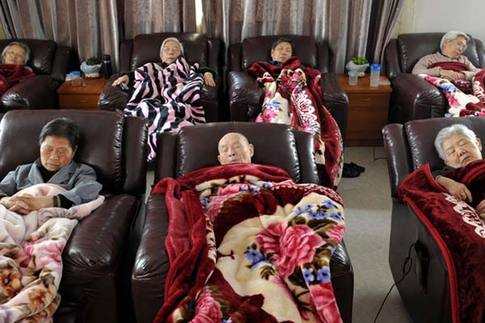日前,國務院對外發(fā)布《關(guān)于加快發(fā)展養(yǎng)老服務業(yè)的若干意見》,提出我國將試點開展老年人住房反向抵押養(yǎng)老保險,即將房子抵押給銀行、保險公司等金融機構(gòu),評估后獲得一筆款項,由金融機構(gòu)按月發(fā)放給抵押人用于養(yǎng)老直到其身故。此舉引發(fā)公眾對“以房養(yǎng)老”的關(guān)切和熱議。
請看相關(guān)報道:
 |
|
Senior citizens sleep at a daytime service center in Shanghai in April. The city has 3.67 million people aged 60 or older, accounting for 25.7 percent of its registered population.[Niu Yixin / for China Daily] |
More than 70 percent of elderly people in Shanghai are open to a house-for-pension program, a survey showed, despite a recent public outcry against the idea raised in a central government document.
雖然近期公眾對國務院提出的“以房養(yǎng)老”建議表示不滿,但近期一項調(diào)查顯示,上海有70%以上的老人表示愿意接受“以房養(yǎng)老”。
“以房養(yǎng)老”的英文表達為house-for-pension program/scheme,也被稱為reverse mortgage loan(住房反向抵押貸款/倒按揭),指房屋產(chǎn)權(quán)擁有者把房子抵押給銀行、保險公司等金融機構(gòu)(deed the house to an insurance company or bank),后者在綜合評估后,每月給房主發(fā)放固定養(yǎng)老金。房主身故后,由該機構(gòu)收回房屋進行銷售、出租或拍賣。
目前,我國已經(jīng)邁入aging of population(人口老齡化)階段。此次國務院發(fā)布的指導意見還指出,我國將進一步發(fā)展home-based care services(居家養(yǎng)老服務),類似的還有community nursing service(社區(qū)養(yǎng)老)。同時普及endowment insurance(養(yǎng)老保險),并為80歲以上的老年人發(fā)放old age allowance(高齡津貼),解決老年人的后顧之憂。
相關(guān)閱讀
居家養(yǎng)老服務 home-based care services
(中國日報網(wǎng)英語點津 Helen)
點擊查看更多新聞熱詞
